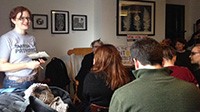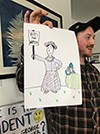By Durham Sociology UCU collective
In the early days of the strike the Durham UCU Sociology members had been inspired by the planned teach outs happening up and down the country. We noted our neighbouring Newcastle University had a very full and well organised schedule of events planned across a range of disciplines and wanted to play our part in Durham. Rather than talk about our usual areas of expertise though, we wanted to think specifically about issues relating to striking and protesting through a sociological lens.
Our teach out - ‘The Sociology of Striking and Protesting’ was arranged largely through a Facebook group that one of our members had set up to coordinate picketing between us. Durham Sociology – staff, postgraduate researchers and students - had had a very visible and strong turnout on the picket lines across the whole of the strike. Like many others had found on picket lines, closer working relationships and new friendships arose amongst those on our pickets through an increased sense of solidarity. Nonetheless, it was still surprising to be able to plan such a fantastic event via just one single facebook thread one Saturday – something that would have surely taken many meetings and endless email trains if this had been a research or teaching away day!
 We quickly realised that we had either chosen too small a pub or invited too many people. (If you ever find yourself stuck at Durham train station for any period of time do walk down the hill to The Station House microbrewery who let us have exclusive hire of for free and also gave a donation to the local hardship fund). The venue was bursting at the seams full of staff, undergraduate and postgraduate students, and postgraduate researchers from across the university from a wide number of departments all keen to hear what Sociology could offer in analysis of the current industrial action but also learn from sociological analysis of other strikes and protests.
We quickly realised that we had either chosen too small a pub or invited too many people. (If you ever find yourself stuck at Durham train station for any period of time do walk down the hill to The Station House microbrewery who let us have exclusive hire of for free and also gave a donation to the local hardship fund). The venue was bursting at the seams full of staff, undergraduate and postgraduate students, and postgraduate researchers from across the university from a wide number of departments all keen to hear what Sociology could offer in analysis of the current industrial action but also learn from sociological analysis of other strikes and protests.
The programme aimed to combine the personal and the political. The day started once our stint on the picket line had finished, with Cath Costello talking about her personal history (herstory) of being a woman on predominantly male picket lines during the miners’ strike and the violence that she witnessed and experienced (The Misadventures of a Midlands Militant). Professor Sarah Banks talked about community organizing Alinsky style, including an overview of the ‘Rules for Radicals’ and how they might relate to our current industrial action.
 Many speakers had to paraphrase quotes because the texts themselves were in their offices that they couldn’t cross the picket line to check, but Dr Nathan Stephens Griffin’s presentation on ‘The Criminalisation of Protest’ really excelled by drawing his own ‘powerpoint’ slides! (see photo). On a similar topic but without the artwork, Professor Roger Smith asked: ‘Who are the real criminals?’ in his presentation and Dr Hannah King considered some of the ways by which young people have been criminalised.
Many speakers had to paraphrase quotes because the texts themselves were in their offices that they couldn’t cross the picket line to check, but Dr Nathan Stephens Griffin’s presentation on ‘The Criminalisation of Protest’ really excelled by drawing his own ‘powerpoint’ slides! (see photo). On a similar topic but without the artwork, Professor Roger Smith asked: ‘Who are the real criminals?’ in his presentation and Dr Hannah King considered some of the ways by which young people have been criminalised.
Postgraduate researcher Karel Musilek widened the scope to changes in higher education more generally in a lecture on ‘Obedience and Misbehaviour in the Neoliberal Workplace’ which managed to be both intellectually stimulating and amusing at the same time. Masters student Amr Ismail presented with Dr Kate O’Brien to widen the scope again, this time to the global South in their lecture ‘Strikes and Solidarity: Lessons from the Global South’. The sessions were chaired by Professor Nicole Westmarland, Dr Nathan Stephens Griffin, and postgraduate researcher Pep Mateos.
This strike has been hugely challenging financially for many of our members. It has obviously been disruptive to our students - the next generation of sociologists. But it has also been wonderful in so many ways. It has given many of us a chance to stop and breathe. To ask ourselves not only questions about what it means for us to be denied an appropriate pension in our retirement, but what this says about university governance and power. Neoliberalism has put many of us on a competitive, stressful hamster wheel that we have not been able to slow down, although some have sadly fallen (or been pushed) off. The challenge now is to ensure that, whatever the outcome of the current ballot, that we take these lessons with us and remember the strength we held and can continue to hold as a collective. Knowledge is power, and just as many of us have never held such in-depth knowledge about pensions, nor have felt the power we now feel we hold to create positive change in higher education.
Follow us @DurhamSociology
